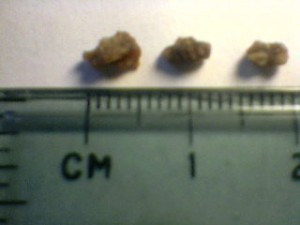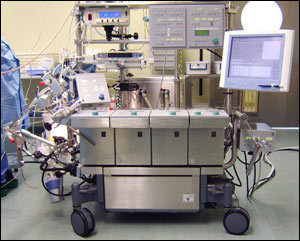How Big are Kidney Stones?
A kidney stone, otherwise called renal calculus, is a solid mass composed of small crystals, usually found in the kidney or the ureter. Sometimes, kidney stones are present in both kidneys; or they can also be present in one kidney plus the ureter.
Studies show that men are more prone to developing kidney stones than women and a large majority of men suffering or have suffered from kidney stones developed these between the ages of 30 and 40 years old.
How Big are Kidney Stones?
There is not one definite answer to the question, “How big are kidney stones?” The sizes vary depending on the severity of the condition.
For some people, they may not even be aware that they already have kidney stones because these are so small – just about the size of a grain of sand – that patients do not feel any of the usual symptoms associated with this medical condition.
A visual representation of the answer to “How big are kidney stones?” is that, apart from taking after the size of a grain of sand; a kidney stone may also grow up to the size of a pebble and in severe conditions, the size of a golf ball!
Asymptomatic stones usually pass through the ureter without causing any pain or obstruction because these are so small.
Now, for “How big are kidney stones?” that cause a certain degree of pain when they pass through the ureter, these are usually between 3 and 5 millimeters in diameter.
Stones that are bigger may require surgical removal.
Tests
If you suspect that you have kidney stones, certain medical tests can help you determine if you do have this medical condition. The tests will also help you determine the answer to “How big are kidney stones?” specific to your case.
Tests that are usually taken to determine the presence of kidney stones and their exact location include sonogram examination otherwise known as ultrasound procedure, a CT scan and an x-ray examination.
Therapy
For those suffering from kidney stones, a change in diet may help remedy the situation. In some cases, increasing water intake helps in the passage of the stones through the urinary tract, thereby eliminating them from your system.
Medications may also be prescribed to lower down the formation of specific types of kidney stones, i.e. uric acid stones.
Surgical Removal
However, if a change in dietary habits or the intake of prescribed medications that target the stones, do not alleviate the condition; surgical removal may be the next best option.
The most common form of surgical removal is a non-invasive procedure called shock wave therapy whereby the stones are broken down into tiny pieces to allow them to spontaneously pass through the urinary tract.





